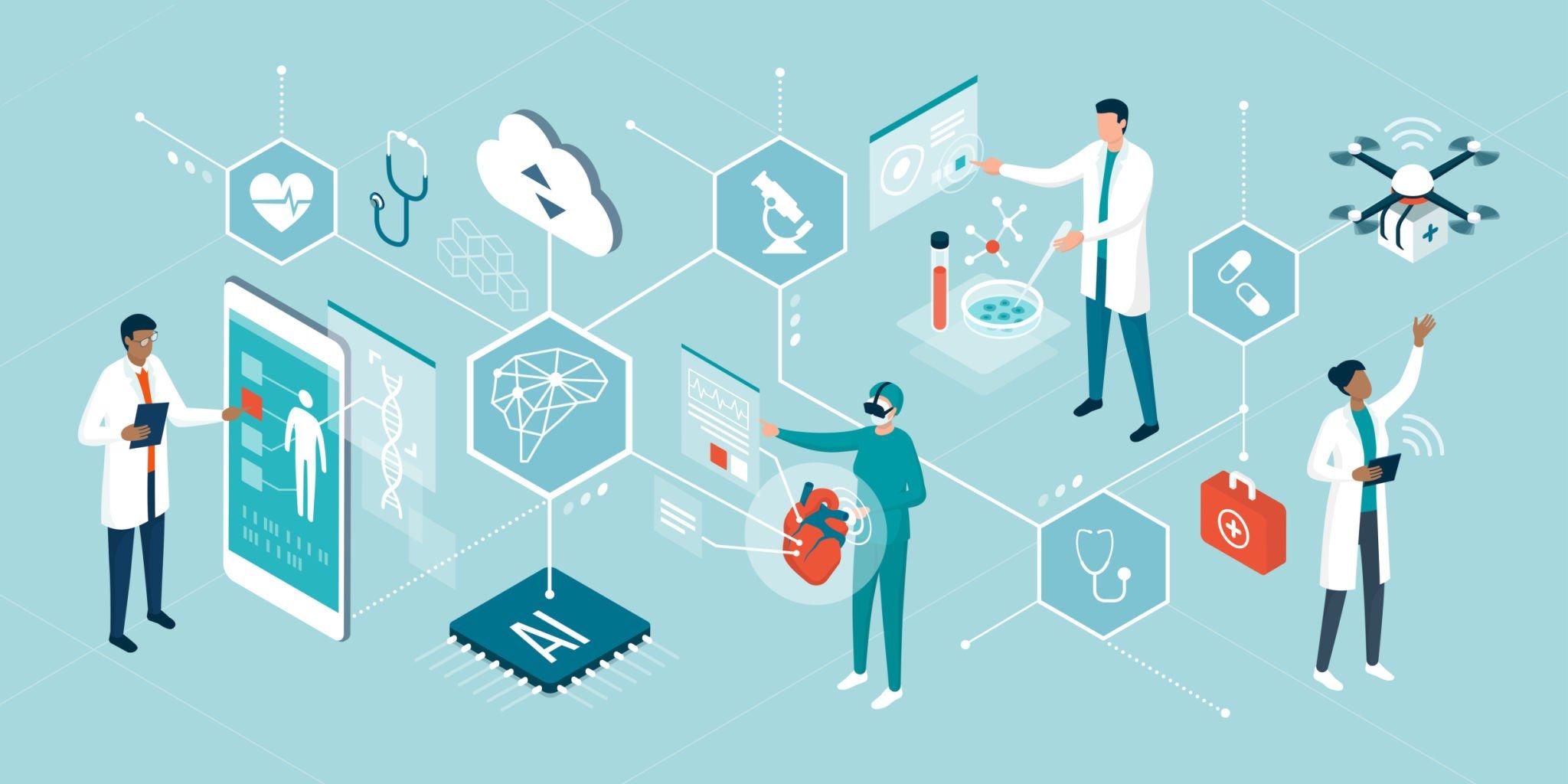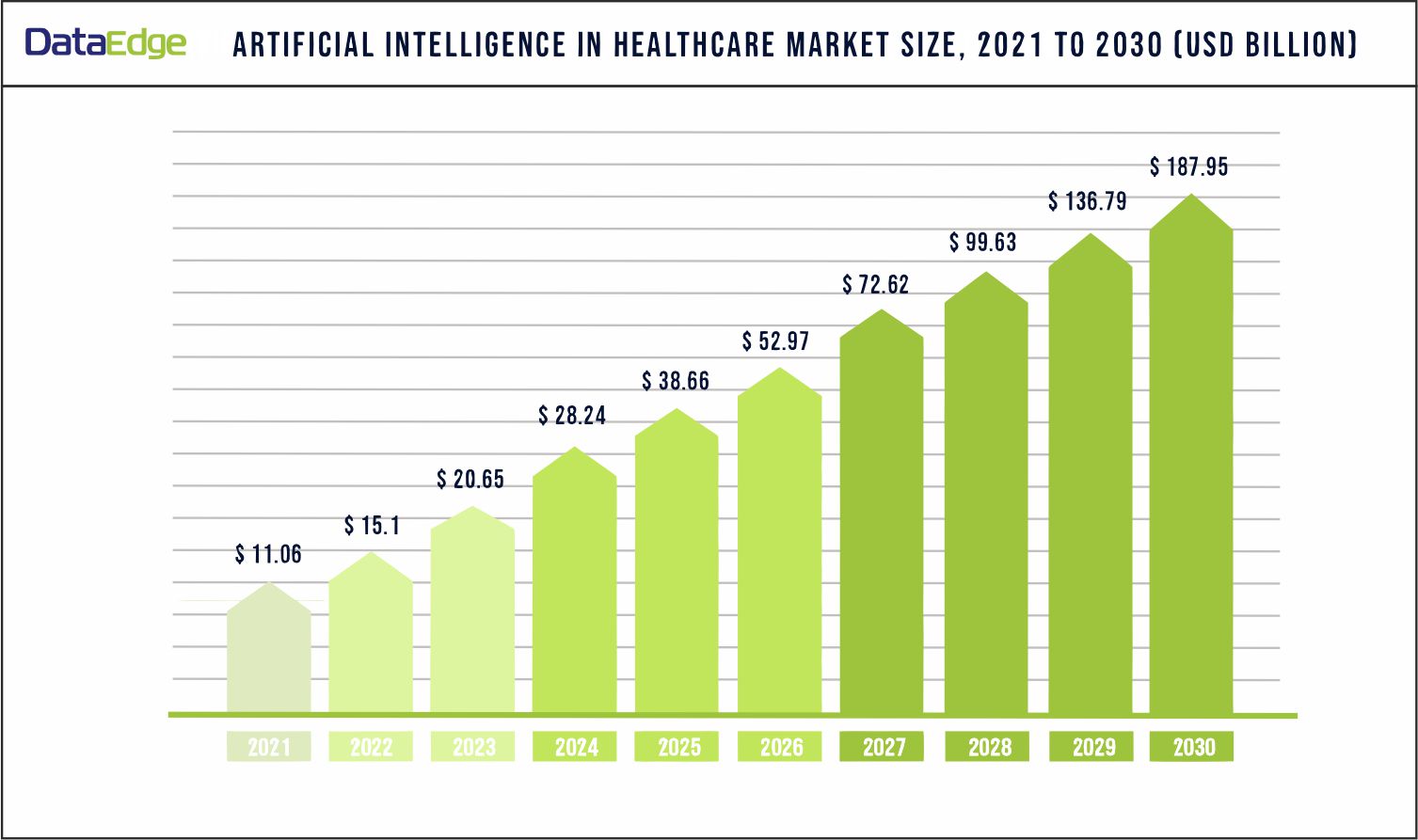Are you curious about how artificial intelligence is boosting the healthcare industry? Well, this blog will provide you with an overview of artificial intelligence and its impact on the healthcare sector.

All About AI
The Covid pandemic had a tremendous impact on the nation’s economy, industrial sectors, livelihood, food, and, most importantly, human health. Everyone has been more cautious about nutrition, health, lifestyle, and fitness since Covid. This is the time when the healthcare industry witnessed a massive revolution in terms of monitoring patients’ health condition, vaccine development, advanced medical automated systems, personalized treatments based on complications, conducting scientific research, understanding the spreading pattern of Covid, generating instant analytics through the data, remote monitoring, chatbots, telemedicine, and much more.
Undoubtedly, thanks to modern technologies such as cloud, blockchain, FitBits, robots, AI, ML, etc have aided in the automation of many medical procedures and treatments, thereby modernizing the healthcare industry.
Explore the blog to learn how the healthcare industry harnesses artificial intelligence to streamline medical routines. Before going further firstly let’s characterize what artificial intelligence is.
John McCarthy devised artificial intelligence, often known as “Computational Intelligence.” Artificial intelligence is a branch of computer science that mimics human intelligence in computer machines such as robots, which are designed to perform tasks and resolve problems by analyzing data in the same way that human brains do. Machine learning and deep learning are subsets of AI that strive to automate learning from unstructured data such as text, images, and videos in order to solve complex problems by making smart decisions.
Role of AI in Healthcare Industry
During this ice age, AI has become an integral part of various industries right from finance to healthcare sectors. Incorporating artificial intelligence into healthcare industries can help healthcare industries to deliver superior personalized patient care while managing administrative processes efficiently and many more. According to past analysis, the global artificial intelligence in the healthcare market was valued at US $11.06 billion in 2021 and is estimated to rise to US $187.95 billion between 2022 and 2030. Therefore China and USA is planning to collaborate with AI in various fields like radiology, dermatology, psychiatry, drug detection, primary care, etc.

Radiology
Basically, a radiologist’s primary responsibility is to examine medical images such as X-rays, MRI, CT, PET, angiography, and ultrasound. A radiologist will evaluate medical images in order to diagnose and treat any disease (or) injury. A radiologist should not make any mistakes throughout this procedure. As a result, it cleared the path for the introduction of AI into radiology to improve accuracy. Machine learning and deep learning, a subset of AI, are used to detect and diagnose diseases, injuries, and abnormalities through the process of image recognition. AI can be used to assist radiologists in suggesting appropriate treatment to doctors and treating their patients as quickly as feasible. AI can be employed in a variety of group therapy, including thoracic imaging, pelvic & abdominal imaging, colonoscopy, brain imaging, oncology, and mammography. Hence, AI in radiology helps doctors in saving their interaction time and treat more patients.
Dermatology
Most people nowadays are concerned about their skin’s health. When you visit a dermatologist, doctors usually use a scanner to diagnose your skin and recommend certain beneficial medications. But how many of you believe that this approach produces reliable results? According to recent studies, a dermatologist can only provide you with an 86% accuracy rate. However, a CNN (Computer Neural Network) can deliver 96% accuracy. Integrating artificial intelligence into dermatology can assist doctors in diagnosing skin cancers in their early stages. Artificial intelligence aids in the deep scanning of skin layers to detect damaged regions. The doctor can provide effective treatment to the patients by concentrating on the problematic regions. Besides CNN, even machine learning and deep learning are leveraged in image processing, identifying skin cells, and keratinocytes.
Drug development
Many diseases have evolved into our ecosystem as a result of changes in human lifestyle and changes in the environment. In order to avoid suffering and dying in this biosphere, we must combat diseases and be adaptive. This will be achievable by producing pharmaceuticals that fight and support our survival. Developing new medications is not an easy process. In fact, developing medicine and bringing it to market takes a large amount of time. Many people suffered from chicken pox a long time ago, but thanks to the invention of the vaccination, we are all now immune to it. But how many of you are aware that developing the vaccine took about 5-6 years? Developing a vaccine is not simple; scientists must conduct extensive research, clinical trials, and analysis of how the vaccine reacts in the human body, as well as its adverse effects before it can be released into the market if the trials are successful. Deep Neural Networks (DNN) are algorithms that are taught to predict drug efficiency and side effects. AI in pharma can benefit companies in bringing pharmaceuticals to market faster.
Psychiatry
Nowadays, it is extremely normal to find most individuals leading a busy lifestyle filled with discomfort, depression, anxiety, and stress. Furthermore, every year, 50% of people commit suicide as a result of depression and anxiety. We are all aware that psychiatrists are the ones who assist people overcome anxiety, sadness, agony, and suicidal tendencies. Psychiatrists are specialists in mental health care. They are responsible for the diagnosis and treatment of mental, behavioral, and emotional problems. They provide medications (or) therapies to patients based on their mental status. The use of artificial intelligence in mental health can benefit doctors. NLP (Natural Language Processing) and machine learning help in analyzing a patient’s mental health, diagnosing the problem, and providing suitable therapy.
Disease diagnosis
AI has the potential to revolutionize the healthcare industry and enable the development of intelligent healthcare systems. AI can evaluate large amounts of data from patients and deliver timely insights. The patient insights are extremely beneficial for evaluating the patient’s medical history and focusing on the crucial areas. Besides from that, the diseases can be easily detected by data analysis and proactive monitoring. Imagine how much time it will take to identify a disease if the entire procedure is done manually by a health professional (or) doctor. No doubt it will take ample time for analyzing and diagnosing the disease. Whereas, with the aid of ML and deep learning, it is now relatively simple to analyze a patient’s data, follow his or her medical state, and provide necessary treatment by diagnosing the disease. By implementing AI in medical diagnostics, management will be able to efficiently regulate administrative routine tasks, and doctors will be able to diagnose and treat diseases more efficiently.
EHR (Electronic Health Records)
Clinical documentation is the sole intention of electronic health records. Whenever we visit a hospital, the nurse provides a booklet and fills in the personal information before presenting it to the doctor. Now the doctor outlines all of the concerns and prescribes a few medications, and asks to carry the same booklet during the next visit. Gathering patient data, organizing it, maintaining such huge amounts of data, and analyzing it has become time-consuming efforts for healthcare providers.
AI has been applied to ease data collecting, data organization, data administration, and data analytics. EHR is a type of digital booklet that contains all of the patient’s records. This allows healthcare providers to track patients’ entire medical history in order to diagnose diseases, make better decisions, and present them with customized medical treatments.
EMR (Electronic Medical Records)
Electronic medical records and electronic health records are quite similar. The main difference between both is that EHR maintains all patients’ medical information on the internet, whereas EMR gives individual medical reports such as prior medical history, diagnosis, allergies, tests, treatment plans, patient feedback, and so on.
AI techniques machine learning and Natural Language Processing (NLP) are leveraged. This comprehensive individual information is maintained on the internet and is quickly accessible by doctors (or) healthcare professionals so that they can make informed decisions while treating the patient. Usually, EMR data is considered while developing new drugs.
Information management
Doctors use AI-driven instructional modules to improve their knowledge and skills on the job, demonstrating AI’s information management capabilities in healthcare. Artificial intelligence in healthcare is a great complement to information management for both doctors and patients. When patients are not brought to doctors quickly, then videoconferencing can be used to deliver the treatment, by saving valuable time and money, alleviating the pressure on healthcare professionals, and promoting patient comfort.
Fitbit’s (Fitness trackers)
Fitness trackers, often known as smartwatches, are now widely used by individuals of all ages. Fitness trackers are no longer limited to measuring steps, thanks to technological advancements. The incorporation of AI into the fitness industry has modernized smartwatch technology. They eliminate the need for people to go to gyms and hire personal trainers in order to remain healthy. The microsensors in fitness trackers provide you with information about your health such as calories burned, heart rate, alarms, standing time, remainders, sleep time, and blood pressure.
It also keeps track of your motions by using an accelerometer, repetitions count, stopwatch, timer, and so on. From now everyone can look after their health, calorie count, and step count via their smartwatches instead of showering money on fitness trainers. The sensors used in fitness trackers are extremely intelligent and completely self-learn. Through customizable features and self-learning, users can easily train the gadgets to perform their everyday normal chores.
Medical care
We are living considerably longer than past generations, and as we approach death, we are dying in a different and slower manner, from diseases such as cancer, heart failure, diabetes, organ failure, and so on. It is also a time when people are frequently solitary. Robots have the capability to transform end-of-life care by allowing patients to stay independent for extended periods of time, decreasing the need for hospitalization and treatment centers. AI, paired with developments in humanoid design, is allowing robots to go even further and engage in ‘conversations’ and other social engagements with people in order to keep aging minds sharp.
Asset management
AI integration with asset management improves the healthcare business in a variety of ways. To begin, asset management systems improve overall patient healthcare by allowing doctors to spend more time with patients rather than worrying about medical equipment. The asset management tracking system assists the workforce in monitoring the medical machinery, its operation, and maintenance. This boosts staff productivity by allowing them to spend less time hunting down the medical care they require. Asset management software lowers total expenses by lowering operational, maintenance, and repair costs for medical equipment.
Apart from the above-listed ones, below mentioned are the few areas in which artificial is used to drive the healthcare sectors.
Conclusion
To conclude, undoubtedly AI has the capability to improve healthcare systems and empower them in the long run. Largely as SMEs are getting more involved in AI development, the technology becomes more practical and well-informed. Automating complex medical procedures can free up clinical schedules while allowing for improved patient interaction. Improving data accessibility helps healthcare providers in taking the necessary precautions to avoid diseases. Real-time data insights can help diagnose the disease and perform necessary treatment more accurately and quickly.
Besides these, AI is being used to minimize administrative inefficiencies and preserve valuable medical resources. Though AI is widely being used in healthcare sectors, there are some constraints and challenges that must be handled and solved. AI still requires human supervision as it is vulnerable to more planned cyberattacks. Despite the challenges and drawbacks that AI confronts, this new technology has the capability to supply enormous advantages to the medical industry. AI is enhancing people’s lives worldwide, whether they are patients or physicians. Thanks to AI.
Finally, what are your thoughts, dear readers? Is it appropriate to incorporate artificial intelligence in the healthcare industry? Please share your thoughts in the comments. Hope the blog is informative.



